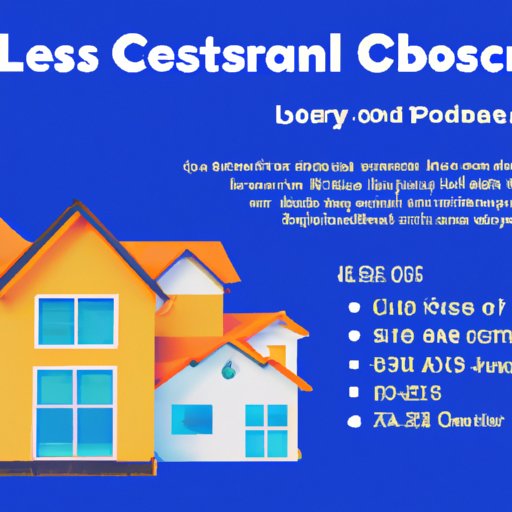Introduction
Closing costs are the various fees and charges associated with obtaining a mortgage. These costs can range from hundreds to thousands of dollars and are typically paid at the closing of the transaction. It’s important to understand what these costs are and how they are calculated in order to make sure you are getting the best deal on your mortgage.

Overview of the Closing Cost Calculation Process
The first step in calculating closing costs is to determine what type of mortgage you are looking for. Different types of mortgages have different associated costs. Once you have determined the type of mortgage you are seeking, the next step is to identify all the applicable fees. This includes loan origination fees, appraisal fees, title search and insurance fees, transfer taxes, escrow fees, document preparation fees, and other miscellaneous fees. After you have identified all of the applicable fees, you can then add them up to get the total closing cost amount.

Breakdown of Typical Closing Costs
Loan origination fees are typically charged by lenders for processing and approving the loan. The amount of this fee will vary depending on the lender and the size of the loan. Appraisal fees are typically charged by appraisers for evaluating the property and determining its value. Title search and insurance fees are typically charged by title companies for conducting a title search of the property and providing title insurance. Transfer taxes are taxes imposed by local governments for transferring the title of the property from one owner to another. Escrow fees are typically charged by escrow agents for managing the closing process and ensuring that all documents are properly signed and filed. Document preparation fees are typically charged by attorneys or other professionals for preparing the necessary documents for the closing. Other miscellaneous fees may include courier fees and notary fees.

Strategies for Reducing Closing Costs
One of the best ways to reduce closing costs is to shop around for the best rates. Different lenders offer different rates and fees, so it pays to compare. Additionally, some lenders offer no-closing cost loans, which allow you to avoid paying any of the closing costs. Lastly, you can always try to negotiate lower fees with the lender or other parties involved in the transaction.
Checklist of Items Needed to Calculate Closing Costs
In order to accurately calculate closing costs, you will need certain information about the property, the mortgage type, the size of the loan, the interest rate, and the down payment amount. It’s important to have this information readily available when you start the process of calculating closing costs.
Comparison of Different Loan Products and Their Associated Closing Costs
Conventional loans typically have the highest closing costs, followed by FHA loans, VA loans, and USDA loans. The exact amount of the closing costs will depend on the particular loan product, but generally speaking, the higher the loan amount, the higher the closing costs. Furthermore, the interest rate and down payment amount will also factor into the overall cost of the loan.
Conclusion
Calculating closing costs can be a complicated process, but it is an important part of the home buying process. Knowing what types of fees are involved and how to reduce those fees can help you save money and get the best deal on your mortgage. By following the steps outlined in this guide, you should be able to accurately calculate closing costs and come away with the best possible deal.


